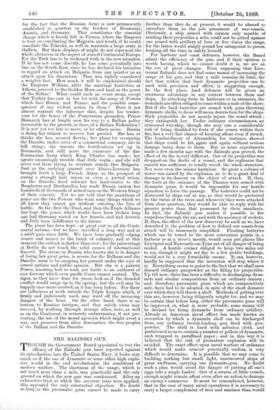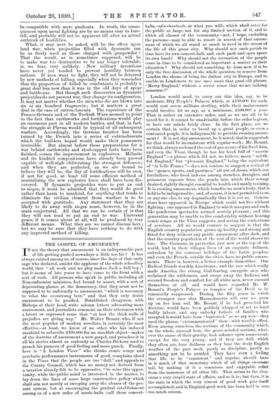THE ZALINSKI GUN. T HOUGH the Government Board appointed to test
the efficacy of the Zalinski gun have reported against its introduction into the United States Navy, it looks very much as if the use of dynamite or some other high explo- sive would in the end revolutionise the conditions of modern warfare. The shortness of the range, which is not much more than a mile, was practically and the only ground on which the new gun was condemned. After an exhaustive trial, at which the severest tests were applied, this appeared the only substantial objection. No doubt as long as the pneumatic guns cannot be made to carry further than they do at present, it would be absurd to introduce them as the sole armament of war-vessels. Obviously, a ship armed with cannon only capable of sending their projectiles a mile, could not be pitted against one armed with artillery of four or five times the range, for the latter would simply pound her antagonist to pieces, keeping all the time in safety herself.
For harbour and coast defences, however, the Board admit the efficiency of the gun, and if their opinion is worth having, which we cannot doubt it is, we are on the eve of great changes. Even supposing that Lieu- tenant Zalinski does not find some means of increasing the range of his gun, and that a mile remains its limit, the fact that within that limit dynamite projectiles can be used with precision and effect, is staggering enough. In the first place, land defences will be given an enormous advantage in any contest between them and ships. In attacking forts in harbours or in estuaries, the ironclads are often obliged to come within a mile of the shore. But if the land batteries are armed with guns throwing dynamite shells, to do so will mean destruction for the ships. Such projectiles do not merely injure the vessel struck ; they extinguish her. -Under ordinary circumstances, an armoured war-ship, though she may run a considerable risk of being disabled by forts if she comes within their fire, has a very fair chance of keeping afloat even if struck. The bombardment of Alexandria, for instance, showed that ships could be hit again and again without serious damage being done to them. But as some experiments made a few months ago with the Zalinski gun proved, the effect of its fire is very different. One of its projectiles was dropped on the decks of a vessel, and the explosion that ensued was sufficient to totally wreck the whole structure. Nor were even the misses harmless. So great a column of water was raised by the explosion as to do a great deal of damage in its descent on the object of attack. If, then, the forts at the entrance of the Thames were armed with dynamite guns, it would be impossible for any hostile squadron to force the passage. The batteries could not be destroyed by ships out at sea, as they would be protected by the turns of the river, and whenever they were attacked from close quarters, they would be able to reply with far greater power than that possessed by their assailants. In fact, the Zalinski gun makes it possible to fire torpedoes through the air, and with the accuracy of rockets. If, then, the effect of the new discovery be such as we have described it, the problem of how to defend our coasts from attack will be immensely simplified. Floating batteries which can be towed to the most convenient points in a harbour or at a river's mouth, would soon put places like Liverpool and Newcastle-on-Tyne out of all danger of being raided. A hostile cruiser obliged to keep two miles out to sea, though it might set fire to a few public buildings, would not be a very formidable enemy. It can, however, hardly be supposed that the invention will stop where it is. Everything seems to point to the fact that we shall soon discard ordinary gunpowder as the filling for projectiles. -Up till now, there has been a difficulty in discharging dyna- mite and similar compositions from an ordinary cannon ; and, therefore, pneumatic guns, which are comparatively safe, have had to be adopted, in spite of the short distance over which they will throw a shell. Methods of getting over this are, however, being diligently sought for, and we may be certain that before long either the pneumatic guns will be improved, or, what is more probable, some means will be devised for firing dynamite from ordinary artillery. Already an American naval officer has made known an invention by which a dynamite shell can be discharged from any ordinary breech-loading gun fired with gun- powder. The shell is lined with asbestos cloth, and partitioned so as to contain a number of pellets of dynamite, each wrapped in paraffined paper ; and in this way it is believed that the risk of premature explosion will be avoided. The exact effect upon naval warfare of ordnance which would make armour practically useless, is very difficult to determine. It is possible that we may come to building nothing but small, light, unarmoured ships of great swiftness, carrying one dynamite-gun. No doubt such a plan would avoid the danger of putting all one's eggs into a single basket. Out of a swarm of little vessels, enough might remain afloat even after an action to damage an enemy's commerce. It must be remembered, however, that in the case of many naval operations it is necessary to carry a larger complement of men and marines than would be compatible with mere gunboats. In truth, the conse- quences upon naval fighting are by no means easy to fore- tell, and probably will not be apparent till after an actual outbreak of hostilities.
What, it may next be asked, will be the effect upon land war, when projectiles filled with dynamite can be as freely used as those charged with gunpowder ? That the result, as is sometimes supposed, will be to make war too destructive to be any longer tolerable, is, we fear, very unlikely. - New military inventions have never yet tended to prevent hostility between nations. If men want to fight, they will not be deterred by new methods of killing, especially when they remember that the proportion of killed to combatants is probably a great deal less now than it was in the old days of spear and battle-axe. But though such discoveries as dynamite projectiles do not prevent war, they change its configuration. It may not matter whether the men who die are blown into six or six hundred fragments ; but it matters a great deal in the case of entrenchments. The experience of the Franco-German and of the Turkish Wars seemed to point to the fact that earthworks and fortifications would play an enormous part in all modern battles, and that, in fact, the struggle at Plevna would be typical of all subsequent warfare. Accordingly, the German frontier has been turned by the French into a series of entrenchments which the builders hoped would make their possessors invincible. But almost before these preparations for a war behind earthworks and steel-capped forts have been finished, comes the improvement in explosives. Melinite and its kindred compositions have already been proved capable of well-nigh obliterating the strongest defences ; and when they are perfected, as we are bound to believe they will be, the day of fortifications will be over, if not for good, at least till some efficient method of neutralising the new explosive force shall have been dis- covered. If dynamite projectiles were to put an end to sieges, it must be admitted that they would do good rather than harm to mankind, for anything that tends to eliminate the civilian element from warfare is to be accepted with gratitude. Any statement that they are likely to do away with sieges must, however, be in the main conjectural. All that we can be certain of is that they will not tend to put an end to war. Universal peace, if it comes about at all, will be produced by very different means. What they are we cannot discuss here ; but we may be sure that they have nothing to do with any improved method of killing.







































 Previous page
Previous page